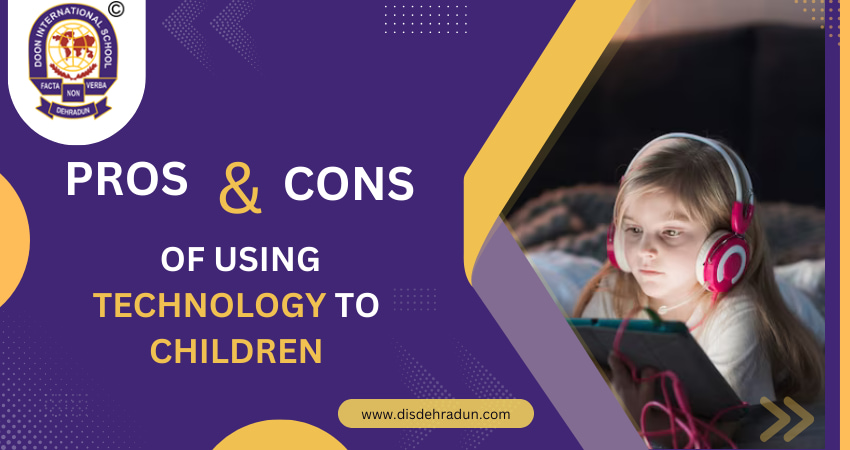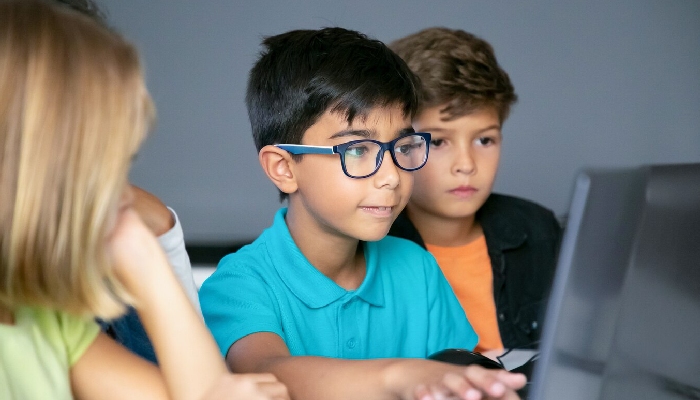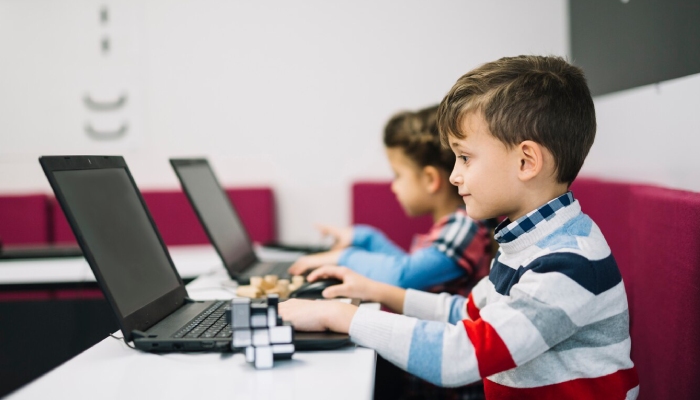Ranked among Top Schools Of Uttarakhand
(Day & Residential)

In the rapidly evolving landscape of education, the integration of technology into children’s activities has become a prevalent and often debated topic. As we navigate this digital age, where smartphones, tablets, and interactive learning tools have become ubiquitous, it’s crucial to examine the pros and cons of incorporating technology into the lives of young learners.
This discussion is particularly relevant in the context of residential schools in Dehradun, where institutions are blending traditional education with modern technological tools.

One of the major benefits of incorporating technology into children’s activities is the potential for an enhanced learning experience. Educational apps, interactive e-books, and multimedia resources can make learning more involving and vibrant.
Technology provides children with entry to a huge amout of detail at their fingertips. Online research and educational websites empower students to explore subjects in-depth, fostering curiosity and a love for learning.
In a world driven by technology, exposing children to digital tools from an early age prepares them for the demands of the future job market. Proficiency in technology is a valuable skill in today’s professional landscape.
Technology permits personalized learning knowledge, catering to individual learning styles and paces. Educational software can adjust to a student’s needs, delivering targeted and customized content.
Digital tools facilitate collaboration among students and between students and teachers. Online platforms and communication tools encourage teamwork, discussion, and the exchange of ideas, preparing students for a socially connected world.

A significant concern with the integration of technology is the possibility of digital interference. The allure of games, social media, and other non-educational content can shift students’ attention away from the planned learning purposes.
Critics argue that excessive screen time can have detrimental effects on children’s health, including eye strain, disrupted sleep patterns, and potential long-term consequences. Striking a proportion between screen-based and non-screen activities is vital.
As students engage with online platforms and educational apps, there is an increased risk of cybersecurity threats and privacy breaches. Protecting sensitive information and ensuring a secure online environment is a critical challenge.
The digital divide remains a significant challenge, with disparities in access to technology among students. Not all children have equal access to devices and a reliable internet connection, leading to educational inequalities.
The immersive nature of technology can lead to a sedentary lifestyle, supporting a decrease in physical activity. It’s essential to balance screen time with activities that promote physical health and well-being.

In the context of residential schools in Dehradun, the incorporation of technology is approached professionally and with careful consideration. These institutions recognize the need to balance traditional teaching methods with modern technological tools to provide a well-rounded education.
Residential schools in Dehradun approach the integration of technology professionally, with educators trained to leverage digital tools effectively. The focus is on enhancing the learning experience instead of returning to conventional teaching techniques thoroughly.
Institutions like Doon International School Dehradun strategically incorporate technology to complement traditional teaching. Interactive smart boards, educational apps, and online resources are utilized to create a dynamic and engaging learning environment.
Recognizing the importance of digital literacy, residential schools in Dehradun often incorporate structured programs to teach students how to steer the digital landscape safely. This includes educating them about online safety, cybersecurity, and the honest usefulness of technology.
Residential schools understand the need for a balanced approach. While technology is embraced for its educational benefits, there is a concerted effort to ensure that students also engage in physical activities, social interactions, and other non-digital learning experiences.
Incorporating technology into children’s activities, when done professionally and thoughtfully, can offer numerous benefits. As seen in residential schools in Dehradun like Doon International School Dehradun, a strategic approach that combines the best of traditional and modern educational practices ensures a holistic learning experience.
However, it’s crucial to remain mindful of the potential drawbacks and address them to create a well-rounded educational environment that prepares students for the challenges of the digital era. Balancing the advantages of technology with a focus on physical well-being and equitable access is key to nurturing the next generation of informed and empowered learners.